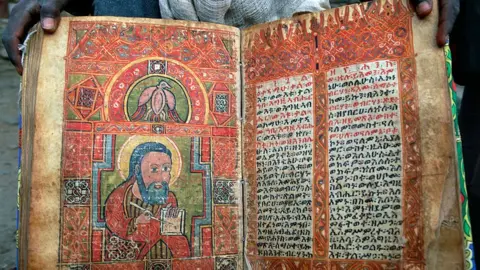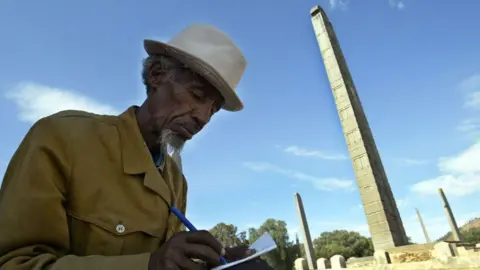 Getty Images
Getty ImagesPlaywright Banna Desta has brought to life an often-overlooked ancient African civilisation in her latest work – a compelling audio drama about an increasingly tyrannical queen and her scheming twin sons.
“As well as wanting the audience to be entertained – because the play is good fun – I wanted to add another dimension to people’s understanding of Africa,” Desta tells the BBC.
“I wanted to write about a time when the continent wasn’t afflicted by colonialism and there were thriving societies,” she says.
The Abyssinians is set in the 5th Century in the Aksumite Empire, also known as the Kingdom of Aksum.
Aksum was a wealthy and influential monarchy that at its height spanned what is now northern Ethiopia, Eritrea, Sudan, southern Saudi Arabia and western Yemen. It lasted almost 1,000 years, from approximately 100BC to AD960.
It was where Christianity first came to Africa and the continent’s first coins were minted.
It lay at the heart of a trade network between India and the Mediterranean and its ships controlled the Red Sea trade through the port of Adulis and the inland routes of north-eastern Africa.
In the third century, it was considered one of the world’s four great powers, alongside Persia, Rome and China.
“I feel like Aksum is completely excluded out of that picture. Ethiopia is a cradle of civilisation – and yet I feel that it is never really included in our understanding of global history,” says Desta.
She chose that part of the world and that period of history because of her personal connections. She was born in the US to a mother from Tigray in northern Ethiopia and a father from Eritrea – the very areas that were at the heart of the old Aksumite empire.
“The impulse was really just wanting to learn more about a pre-colonial era – and I thought a wonderful place to start is my own heritage and ancestral lineage.”
The Abyssinians, released by Audible and directed by Shariffa Al, is Desta’s first audio play. It is a tragicomedy that mixes historical fact with the author’s imagination.
The play is “really also about the ways in which people hold on to their humanity in periods of immense change”, Desta says.
It tells the story of a monarchy at a crossroads in history.
 Getty Images
Getty ImagesQueen Yodit must decide which of her twin sons – Kaleb or Negus – must succeed her to the throne, just as she is contending with social and economic upheaval and clashing beliefs about religion and rights. There is also romance.
“Queen Yodit is… complex, regal, cunning, raw, sensual and compelling,” says Danielle Deadwyler – the Bafta-nominated movie star who played the role.
The character of Yodit was loosely inspired by the real Queen Yodit – or Judith – who reigned at a different time to the period in which the play is set.
She is a figure shrouded in mystery because of the lack of historical records and conflicting folklore about who she was.
She is seen by some as dictatorial and instrumental in Aksum’s downfall, says Desta – who travelled to Ethiopia as part of her research for the play.
“I thought that she was a good jumping-off point for that type of character,” Desta says.
“I think a lot of times the characters of female leaders have to be so ‘on point’ – and I love the idea of a woman being a tyrant in this period of history.”
Writer James Baldwin once said that artists are “emotional or spiritual historians” – and those words resonated profoundly with Desta as she wrote the play.
“I wanted to explore the full spectrum of human emotions – the characters’ private feelings, the things that they struggle with as human beings that have nothing to do with their public roles,” she tells the BBC.
Queen Yodit was a character who Desta felt did not have much love in her life.
“A lot of her reactions to the world are coming from that place of not being cherished as a partner and not really necessarily feeling like she has a place or that she has chosen to be a leader,” Desta says.
 AFP
AFPAnother female character written to break stereotypes is Makeda, played by Arsema Thomas of Bridgerton spin-off Queen Charlotte fame.
She is sent to work as a servant in the royal household to pay off her father’s debts. But she is also someone “who can think for herself, can think bigger than her station in life and is a global thinker”.
Despite being set in a world of antiquity, the dialogue and dry humour in The Abyssinians makes it feel modern and relevant.
Queen Yodit, especially, is fond of dropping a snide comment right in the middle of a serious moment.
The production features an original Ethio-jazz score by DA Mekonnen, an Ethiopian-American musician, and Andrew Orkin – and features the Ethiopian-born multi-instrumentalist Kibrom Birhane.
“The score parallels and complements the tone of the play,” says Desta “because I feel like a lot of Ethiopian music has that ancient quality and then jazz is that sort of contemporary spin.”
 Lia Chang
Lia ChangTony-winner André De Shields described being in The Abyssinians as an “opportunity of returning to one’s ancient culture” and an illustration of “the power of art to transform lives”.
It was crucial to Desta that actors of the black diaspora play the characters.
The cast also includes Zainab Jah, who in 2021 won the best actress award for Farewell Amor at Fespaco, Africa’s leading film festival.
Chukwudi Iwuji, who began his acting career with the Royal Shakespeare Company in the UK, and Phillip James Brannon, best known for his Broadway roles and the movie Contagion, also star.
“The talent was amazing,” Desta says, “I know that that doesn’t really happen for a lot of early playwrights, so I’m especially grateful.”
Desta’s next goal is to get The Abyssinians on to the stage with, she hopes, the same cast.
You may also be interested in:
 Getty Images/BBC
Getty Images/BBCArticle by:Source























